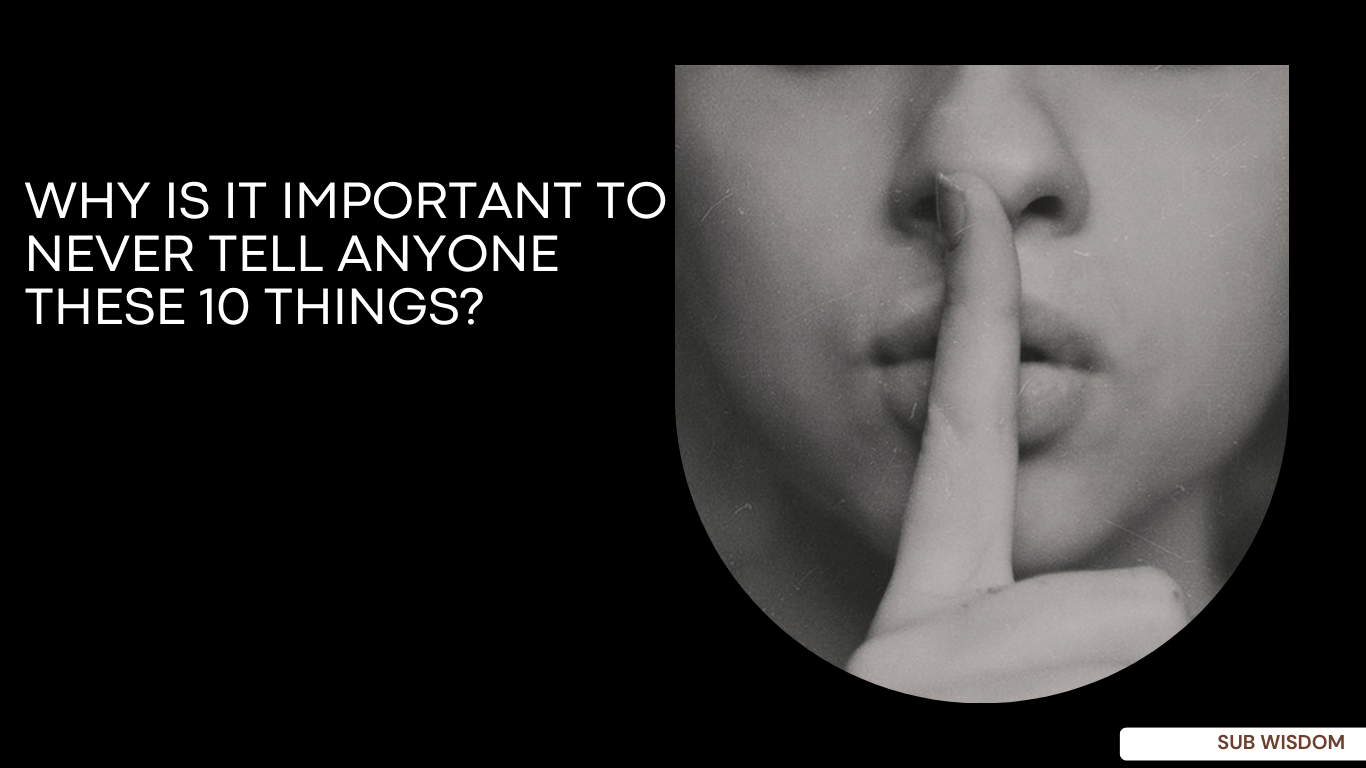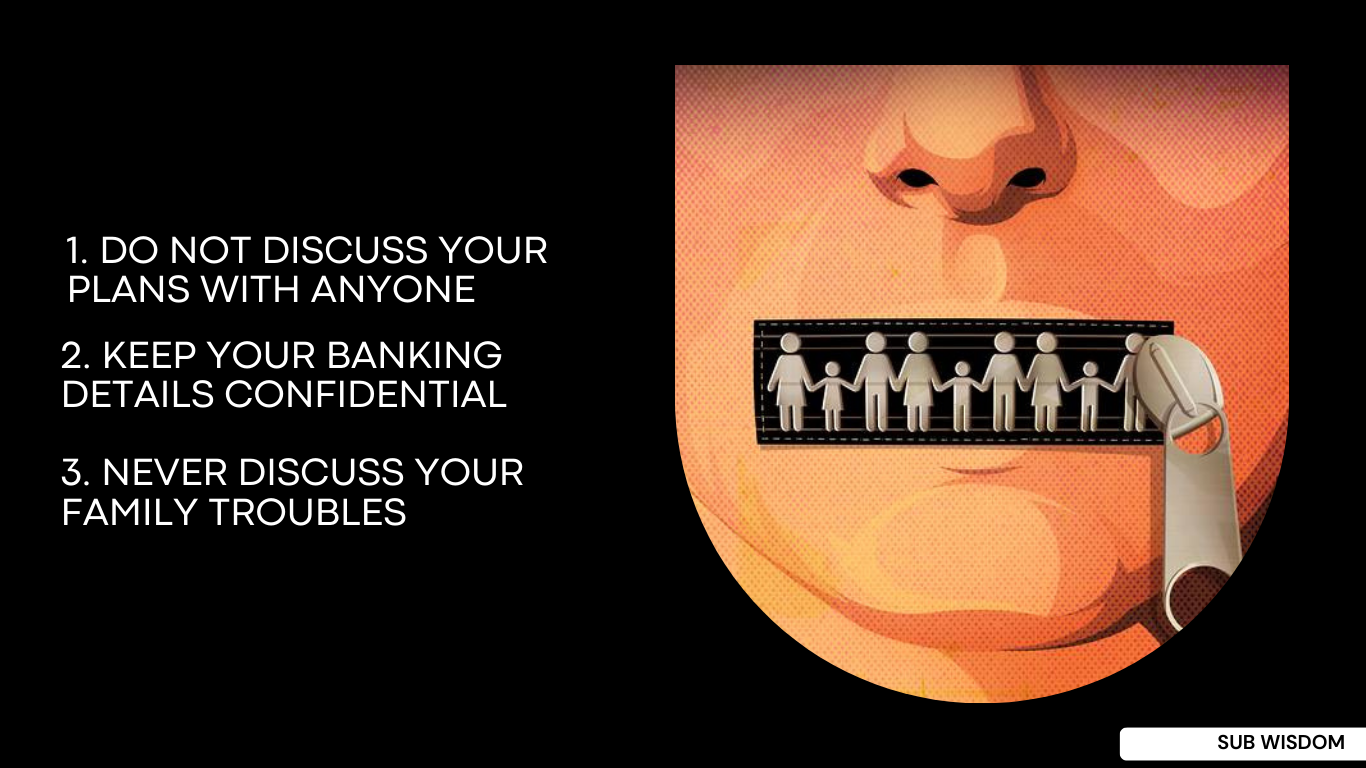While it is crucial to be open and honest with others around us, some topics should remain private. Knowing what to keep private can help you preserve your connections, reputation, and even your own safety.
We all have things we’d rather keep to ourselves, but it can be tough to determine where to draw the boundary. In this essay, we’ll look at some of the most crucial items you should keep private.
From personal facts about your life to sensitive information about others, we’ll go over a variety of issues to help you understand what should be kept private.
By the end of this article, you’ll have a better grasp of why certain topics should be kept private and how to determine what to share and what to keep to yourself.
So, whether you want to safeguard your privacy, create trust with others, or prevent bad consequences, keep reading to find out what you should keep private.

Also Read: 12 Important Japanese Ideas for Today’s World
Why Is It Important to Keep Secrets?
Secrets are a normal aspect of life. We all have personal or secret information that we prefer not to share with others. But have you ever considered why it is necessary to keep certain things secret?
So, let’s look at some of the reasons why keeping secrets can be important for protecting your privacy, establishing trust with others, and maintaining your reputation.
So, whether you’re a natural secret-keeper or someone who struggles to keep things private, read on to learn more about the value of keeping secrets.
Maintaining your privacy
The most obvious reason to maintain secrets is to safeguard your privacy. Your personal information, such as financial information, medical history, or intimate relationships, is confidential and should only be shared with those you trust.
Keeping this information private allows you to avoid unwanted attention, shame, and even harm.
Developing and retaining trust
Sharing secrets with others is an indication of trust. When you share something intimate about yourself with another person, you demonstrate that you trust them enough to keep your secret secure.
On the other side, keeping someone else’s secret demonstrates that you are trustworthy and reliable. This can deepen relationships and foster mutual respect.
Avoiding hazardous circumstances
Sharing secrets can occasionally result in undesirable effects. Sharing sensitive information about someone else, for example, may embarrass them or land you in a scenario you’d prefer avoid.
By maintaining secrets, you can avoid potentially dangerous situations entirely.
Maintaining your reputation
When you share confidential or sensitive material, you risk harming your reputation. Others may perceive you as untrustworthy or unreliable if they believe you are unable to keep things to yourself.
Keeping secrets allows you to preserve a great reputation while also demonstrating your ability to be discreet and considerate.
10 Things You Should Keep to Yourself

1. Do not discuss your plans with anyone.
One of the most common mistakes people make is disclosing their plans to others. It’s normal to want to share joyful news with friends and family, but doing so might be perilous. People can not only mistakenly or purposefully discuss your goals with others, but they can also offer unwanted advise or criticism, which can disrupt your plans.
It’s preferable to keep your plans to yourself until you’re ready to act.
2. Keep your banking details confidential.
Financial information constitutes some of the most private data you have, so keep it confidential. This includes your bank accounts, credit card details, and tax records.
Avoid exchanging this information with anybody unless absolutely essential, and always do so securely.
3. Never discuss your family troubles.
Your family is your support system, and it is normal to want to confide in them when you are experiencing challenges. However, when it comes to discussing family issues with outsiders, it is critical to use discretion.
While you may be comfortable discussing your family concerns with close friends or confidants, it is typically preferable to keep them private.
Sharing family concerns with others might result in misunderstandings, gossip, and more problems. It may also be harmful to the individuals concerned, especially if they do not want others to know about their personal troubles.

4. Do not discuss private aspects of your life.
Your personal life is exactly that—personal. While it is normal to want to share personal information with others, you must exercise caution. Sharing sensitive facts about your life might leave you susceptible to censure, criticism, and even exploitation.
It’s vital to realise that not everyone has your best interests in mind. When providing personal information, evaluate the person you’re speaking with and if you trust them with that information.
It’s also critical to establish boundaries and understand when to stop providing information if you feel uncomfortable or dangerous.
5. Never brag about how brave you are.
We all enjoy sharing our accomplishments with others, especially when they include doing something courageous or bold. However, excessive discussion of the subject might be detrimental. People may perceive you as arrogant or self-centered. Furthermore, it might make people uncomfortable or even annoyed.
If you actually accomplished something heroic, there’s no need to constantly telling everyone about it. Allow your actions to speak for themselves. If you keep talking about it all the time, folks may believe you’re simply trying to garner attention or make yourself feel better.
It’s OK to discuss your successes with others, but don’t gloat too much. If you talk about it in a humble manner, you can inspire people and demonstrate the value of courage and bravery. However, bragging too much might make you appear selfish.
6. Avoid bringing up bad things you have heard.
We’ve all heard juicy gossip about somebody we know, whether they’re a friend, family member, or coworker. However, before you tell anybody else, think about the possible implications. Sharing bad information may harm relationships and cause upset sentiments. It might also make you appear unprofessional and untrustworthy.
It is normally preferable to keep such information to yourself, only sharing it when absolutely required and in a courteous manner. If someone else is gossiping about you, do not join in and start spreading the rumours. Instead, be cool and impartial, and try not to take sides.
Overall, it is preferable to focus on positive and uplifting themes in talks with people. Keep the unpleasant stuff to a minimal, and you’ll be more likely to have strong and healthy connections. You might also check out our previous article on the best relationship books for a good relationship.
7. Issues with your relationship.
Relationships may be difficult, and when things go wrong with your spouse, it’s normal to rant and seek counsel from others. However, you should use caution when choosing someone to open yourself to. Sharing sensitive facts about your relationship with friends, relatives, or even coworkers may have unanticipated repercussions.
For starters, it can erode trust and intimacy between you and your spouse. If your spouse discovers that you’ve been discussing intimate matters with others, they may feel wounded or deceived.
Furthermore, disclosing your partner’s shortcomings to others might make them appear horrible, yet every relationship has ups and downs.
Furthermore, oversharing about your relationship with others might make things unpleasant. Your friends and family members may be uncomfortable learning personal details about your love life, or they may feel compelled to take sides or provide unwanted advise.
Of course, it’s critical to have a support system and seek assistance when necessary. If you’re having problems in your relationship, try speaking with a therapist or counsellor who can provide professional and unbiased advice.
Alternatively, confide in a trustworthy friend who will keep your chats private.

8. Your vulnerabilities.
It might be difficult to confess your flaws, but you must be aware of who you discuss them with. While being honest about your limits is important for personal development, oversharing may have negative implications.
For starters, disclosing too much about your flaws may cause others to mistrust your talents and expertise. This may be especially detrimental in professional situations when confidence and skill are required.
Furthermore, acknowledging your flaws may expose you to judgement and criticism from others. It is critical to remember that not everyone has your best interests in mind, and some individuals may exploit your weaknesses.
However, do not allow this deter you from getting assistance or support when you need it. Recognising that we all have flaws is a vital step towards personal development, and it’s OK to seek help. Just make sure you confide in someone you can trust and who has your best interests at heart.
9. Discuss your future ambitions.
It is quite normal to want to inform people about your future ambitions and objectives, especially those close to you. However, you must use caution in deciding who to tell and how much information to give.
Telling others about your future ambitions might be a good or terrible thing. On the one hand, it may inspire and motivate others, perhaps leading to new relationships and possibilities. However, telling the wrong people or doing so in the wrong way might have disastrous consequences.
For example, informing someone who isn’t supportive or has a bad attitude might pull you down and ruin your mood. Furthermore, discussing too much about your intentions with individuals you don’t know might put you at danger of receiving unwelcome advice or having your ideas stolen.
It’s critical to strike the correct balance between sharing your goals with others and keeping them to yourself. It’s OK to talk to a trustworthy friend or mentor who can offer you support and advise, but you shouldn’t reveal too much to just anybody.
10. Do not disclose personal information on social media.
Sharing too much personal information on social media can have major ramifications for both your personal and professional lives. It’s critical to understand that sharing personal information such as your complete name, date of birth, or home address might make you a prime target for identity theft and other fraudulent actions.
Furthermore, excessive social media posting might damage your reputation. Potential employers or clients may review your social media profiles before making a choice, and viewing incorrect or unprofessional posts might harm your chances.
To be secure on social media, avoid revealing personal information such as your phone number, address, or financial information. It’s also a good idea to think twice before revealing sensitive themes or personal experiences, and to be aware of who can read your posts.
Remember that once anything goes online, it might be impossible to delete completely, so consider before you post.

Conclusion:
Keeping certain items private might provide a variety of benefits. There are several reasons why we should keep secrets, including safeguarding our privacy and personal information, keeping good relationships, and avoiding unneeded disputes.
By following these ten recommendations for what to keep to ourselves, we may take charge of our life and protect our well-being.
Remember that preserving secrets does not need us to be dishonest or untrustworthy. It just involves being aware of what we share and with whom.
So, the next time you’re confused about sharing anything, ask yourself: “Is this something I need to keep to myself?” This will help you live a happier, healthier, and more satisfying life.




[…] Also Read: Why Is It Important to Never Tell Anyone These 10 Things? […]